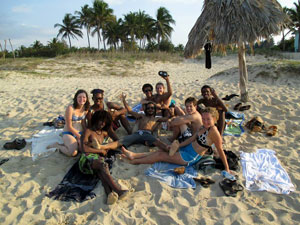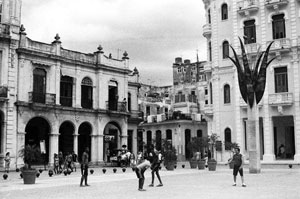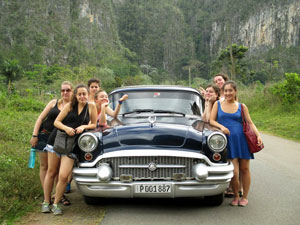
Did you run into a language barrier? Did you ever think you knew more/less of the language?
Malissa: When I arrived in Cuba, I was already proficient in Spanish; but it took a month before I could easily communicate with a Cuban. Part of this was because of the thick Cuban accent which differs greatly from the clear, crisp Mexican Spanish I was used to.
Another part was due to the fact that most of Cuba seems to feel they are being charged by the minute in every conversation: I have never heard anyone speak so fast in any language before!
But probably the most significant factor of the language barrier was the use of island-specific slang. For example, “Qué bolá, asere” is the Cuban equivalent of “Qué tal, hermano!” but would mean nothing in most of Latin America. Some of my friends sat me down in a café one day determined to teach me “cubañol.”
They spent at least an hour listing out all the slang terms they could think of and their definitions—I still have the napkin with this make-shift vocal list tucked away in my standard Spanish dictionary.
Do you feel you got a chance to see the city from a local's perspective?
Malissa: Havana—like all great things—is multi-faceted and multi-layered. It would be all too easy to visit every monument, museum and restaurant in the city and still miss the rich thriving culture beneath the surface. Throughout my time there, it seemed like every week I pulled back a new layer of the complex reality of Cuban life.
The questions we all had about everything from politics and propaganda to daily life and culture seemed to either have no answers or an infinite number of contradicting answers: with each layer we peeled back from the city’s tourist face we were faced with a new level of reality—a new side of the truth.

The length of my stay and the nature of my program—taking classes with locals and having plenty of opportunities to get to know my neighbors—really helped in this endeavor to get to know the city from a local perspective. Although we can never truly understand someone else’s life, my time in Havana brought me closer to that goal than I could have hoped.
Tell us about any interesting cultural tidbits you noticed about your country.
Malissa: Although, overall, I loved my time in Cuba, there were some parts of the culture that I found impossible to adjust to. The general lack of respect for women, for example, was something that I refused to acclimate myself to.
Catcalls and nasty comments follow women down the street in many places, but Cuba took it to a new level. Accustomed to respecting myself and expecting respect from others, I was baffled and speechless when men shamelessly unzipped their pants to masturbate at myself and other women in the middle of the day on a crowded street.
Learning the powerlessness of women in this culture and living in it was one of the hardest things I’ve ever done. Considering the overall beauty of the culture, I was disappointed to see such blatant contempt for half of the population; this is something that I hope will be soon forgotten as Cuba evolves and changes with the times.

What was the best place you visited outside of your home-base city?
Malissa: Outside of Havana, Piñar del Río was definitely the most beautiful piece of Cuba that I saw. My friends and I stayed in a hostel at the edge of the small town and woke up to the beautiful Caribbean sunrise over luscious green mountains.
We were lucky enough to find a tour guide to take us horseback riding up one of these mountains through thick jungle in places and into deep caves and finally to a tobacco farm where we met one of the makers of Cuba’s world-renowned cigars and smoked a genuine Cuban cigar with him.
The quiet peacefulness of the town was refreshing and rejuvenating after months of the hustle and bustle of Havana. My trip there remains one of my fondest memories of the country.